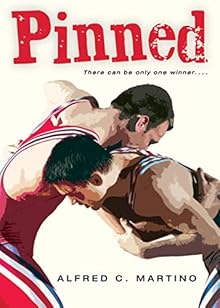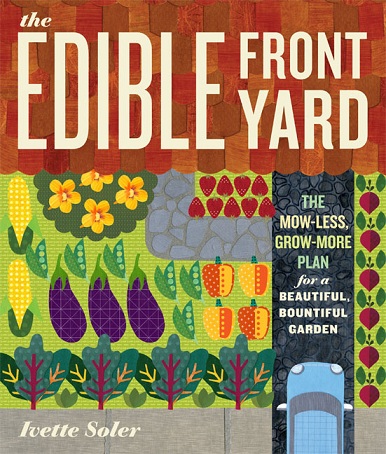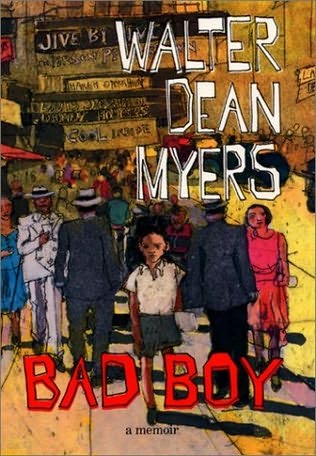 I'd seen the book "Pinned"(by Alfred C. Martino) sitting on the library bookshelves for the last few years and I finally decided to check it out for summer break for a handful of reasons: 1. there's a perception, particularly among boys, that reading isn't cool and I felt compelled to find some guy-lit that was solid. 2. I probably relate more closely with boys/ young men and the subject matter in "guy-lit" because of my love for competition and adventure and my extreme distaste for romance novels 3. a family friend (my sister's boyfriend & one of my college friends) recently put together a documentary by the same name as this novel and I was curious if there was any overlap between his movie and the novel (the only overlap is that both stories primarily follow two teenage wrestlers- but the movie deviates is a totally different style & genre than the book). 4. Lastly, I needed a book that would kick my athletic competitiveness into overdrive because I was preparing to run a 5k in my old hometown and I wanted to push myself that extra bit.
I'd seen the book "Pinned"(by Alfred C. Martino) sitting on the library bookshelves for the last few years and I finally decided to check it out for summer break for a handful of reasons: 1. there's a perception, particularly among boys, that reading isn't cool and I felt compelled to find some guy-lit that was solid. 2. I probably relate more closely with boys/ young men and the subject matter in "guy-lit" because of my love for competition and adventure and my extreme distaste for romance novels 3. a family friend (my sister's boyfriend & one of my college friends) recently put together a documentary by the same name as this novel and I was curious if there was any overlap between his movie and the novel (the only overlap is that both stories primarily follow two teenage wrestlers- but the movie deviates is a totally different style & genre than the book). 4. Lastly, I needed a book that would kick my athletic competitiveness into overdrive because I was preparing to run a 5k in my old hometown and I wanted to push myself that extra bit.Did "Pinned" satisfy all of these desires? Yes. Except, that I'm not sure how strongly I would recommend the book because of the unsatisfying end (at least to me). However, it did push me to be competitive and push my training, it allowed me to see how much it overlapped with my friend's movie and it gave me at least another book to possibly suggest or even simply know as my students look for suggestions and put together projects based on novels they chose.
"Pinned" follows the senior years of two wrestlers: Bobby Zane and Ivan Korske. The chapters bounce back and forth between the two wrestlers and their conflicts.
Bobby Zane is a rich white boy whose parents are constantly arguing. Bobby is in love with a Portuguese-American girl name Carmelina. Bobby is straight laced but hormone-driven. He's almost always a cool customer, except for when he feels that his parents are messing with his and his little brother's lives or when Carmelina misses her period. Bobby trains hard while at practice and he counts his calories and fluid intake to the point of absurdity- which made me wonder about whether or not I'd recommend this novel to teens because the main characters do some dangerous things (starving, going without fluids, extreme sweating, using diuretics) all in the name of working for a state title and without repercussions. All of this is semi-supported by Bobby's hard-pushing, but loving father.
Ivan Korske is a real contrast for Bobby in that Bobby looks like a spoiled brat next to Ivan's self-lessness (at least at times). Ivan lives with his soft-spoken, widower father. Ivan and his father are still raw from the mother's recent death. Ivan sees wrestling as his ticket out of town and through college. However, Ivan's father wants Ivan to stay in the area and Ivan's good female-friend Shelley also wants him to stay- mostly so that the two can pursue a relationship that involves more than studying together.
I really enjoyed the two boys' stories and conflicts. It was refreshing to find very solid conflicts and some resolutions to each of these conflicts. However, I was left disappointed with the ending in that the author didn't seem to have the guts to pick a clear winner in the state title. The open-endedness leaves possibilities (especially now that I think about it for teaching purposes), but it also felt like a cop-out and it made me think that the author had simply tired of the story or he just couldn't pull the trigger. Would I recommend the book for sheer reading pleasure? Not necessarily. Would I use the book as a teaching tool with teens? Yes, but only if the teens had an adult-led discussion because there's some great potential for the reader to interpret some very harmful practices as being acceptable or even positive and these issues DEFINITELY need to be addressed. With the proper guidance, it'd be a good book to encourage critical thinking skills, but left unaddressed it could plant some dangerous ideas.





